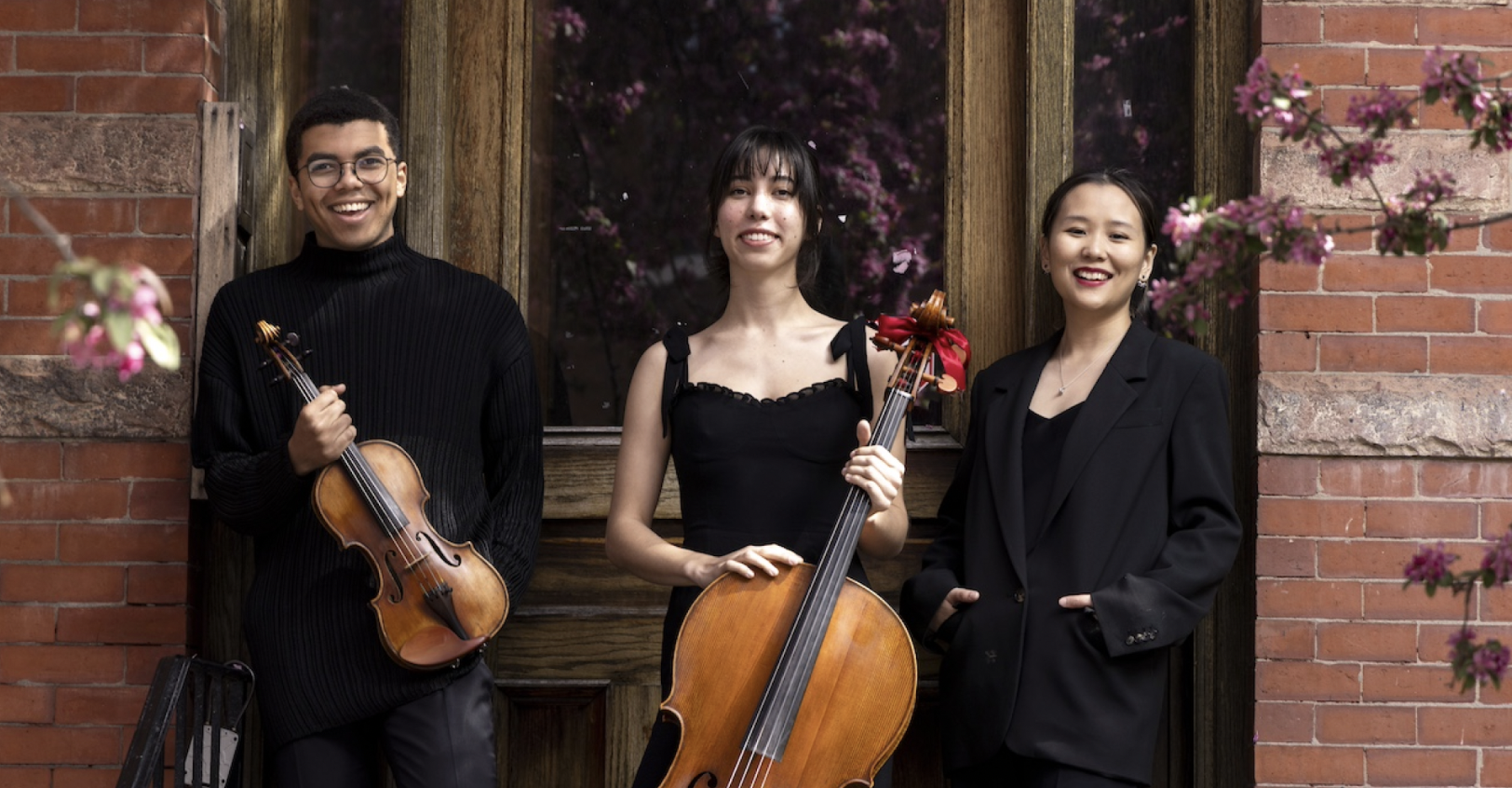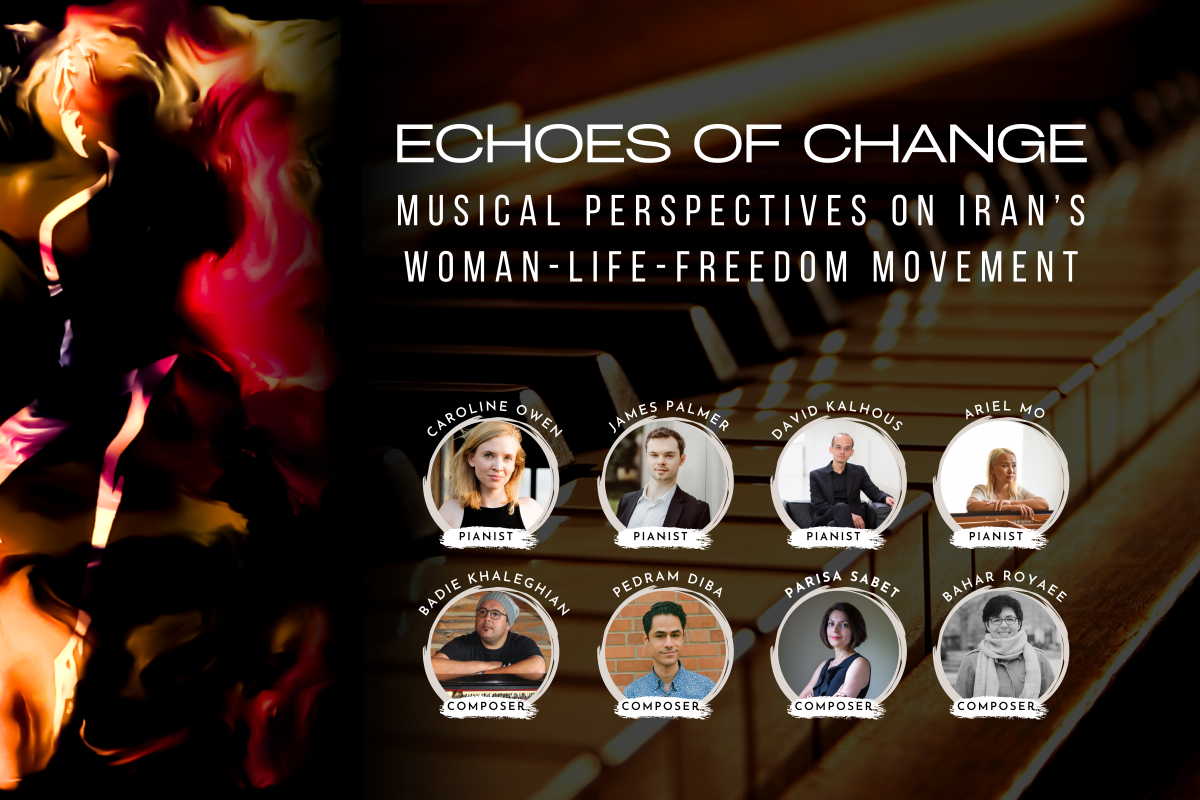For Trio Gaia’s 2024-25 season, click here.

ALL THE WRONG NOTES: Charles Ives 150 Part IV
In four concerts, ALL THE WRONG NOTES: Charles Ives at 150 celebrates the 150th anniversary of composer, keyboardist, actuary, and businessman Charles Ives. Largely rejected in his youth, this native son of green New England famously gained renown only later in life and is today remembered as an iconoclast of American music. Ives’ musical agenda might best be summed up by the Connecticut minister who programmed Ives over the protests of his congregation: “God gets awfully tired of hearing the same thing over and over again.” Ives was a relentless visionary yet also a traditionalist, worshiping Beethoven and turning up his nose at Ravel and Schoenberg, whose music he claimed he never heard. Described variously as “gibberish,” “impossible,” like “awfully indigestible food,” Ives’ works draw directly from European techniques and suffuses them with the spirit and sounds of early 20th-century America, quoting popular tunes, band music, revival hymns, barn dances, and ragtime, invoking memories of holidays and parades alongside references to Transcendentalist philosophy.
ALL THE WRONG NOTES: Charles Ives at 150 concludes on Nov. 12 with Charles Ives’ rambunctious and devilish Piano Trio, performed by Boston-based Trio Gaia (Grant Houston, Yi-Mei Templeman, and Ariel Mo). Also on the program is Ives’ Decoration Day, arranged for violin and piano (Xak Bjerken and Grant Houston), Winnsboro Cotton Mill Blues by Frederic Rzewski (Isaac William Dorio), “The Alcotts” from Ives’ Concord Sonata (Federico Ercoli), and a new premiere by doctoral composer Jasmine Morris (Ariel Mo).


ALL THE WRONG NOTES: Charles Ives 150 Part III
Midday Music in Lincoln: In four concerts, ALL THE WRONG NOTES: Charles Ives at 150 celebrates the 150th anniversary of composer, keyboardist, actuary, and businessman Charles Ives. Largely rejected in his youth, this native son of green New England famously gained renown only later in life and is today remembered as an iconoclast of American music. Ives’ musical agenda might best be summed up by the Connecticut minister who programmed Ives over the protests of his congregation: “God gets awfully tired of hearing the same thing over and over again.” Ives was a relentless visionary yet also a traditionalist, worshiping Beethoven and turning up his nose at Ravel and Schoenberg, whose music he claimed he never heard. Described variously as “gibberish,” “impossible,” like “awfully indigestible food,” Ives’ works draw directly from European techniques and suffuses them with the spirit and sounds of early 20th-century America, quoting popular tunes, band music, revival hymns, barn dances, and ragtime, invoking memories of holidays and parades alongside references to Transcendentalist philosophy.
This third concert on Oct. 31 features Charles Ives’ Three Quarter-Tone Pieces, S. 128, performed by two players on two pianos, one de-tuned by a quarter-tone, followed by two solo works that will each be played by one pianist on two quarter-tone pianos simultaneously: Little Pieces for Quarter-Tone Piano by Tui St. George Tucker (Thomas Feng) and Hommage to Josef Mattias Hauer, from Three Hommages by George Friedrich Haas (Jack Yarbrough).

ALL THE WRONG NOTES: Charles Ives 150 Part II
In four concerts, ALL THE WRONG NOTES: Charles Ives at 150 celebrates the 150th anniversary of composer, keyboardist, actuary, and businessman Charles Ives. Largely rejected in his youth, this native son of green New England famously gained renown only later in life and is today remembered as an iconoclast of American music. Ives’ musical agenda might best be summed up by the Connecticut minister who programmed Ives over the protests of his congregation: “God gets awfully tired of hearing the same thing over and over again.” Ives was a relentless visionary yet also a traditionalist, worshiping Beethoven and turning up his nose at Ravel and Schoenberg, whose music he claimed he never heard. Described variously as “gibberish,” “impossible,” like “awfully indigestible food,” Ives’ works draw directly from European techniques and suffuses them with the spirit and sounds of early 20th-century America, quoting popular tunes, band music, revival hymns, barn dances, and ragtime, invoking memories of holidays and parades alongside references to Transcendentalist philosophy.
This second concert on Oct. 25 features all four rarely-heard Violin Sonatas, performed by guest violinist KJ McDonald and DMA pianist Ariel Mo. Ives once recalled the dramatic (or dramatized) moment when he presented the First Violin Sonata to an unnamed violinist, who, after a couple of measures, became enraged at the plethora of notes and rhythms. He told Ives: "This cannot be played. It is not music, it makes no sense.” Ives liked to use this anecdote to explain why, in the later sonatas, he seemed to allow frequent moments of soft, sublime lyricism, calling them “an attempt to please the soft-ears and be good.” Rhapsodic and inventive, rich with references to the popular tunes and cultural settings of New England, these sonatas showcase the whirling imagination and fearless complexity of Ives’ writing, but is also replete with moments of deep-seated nostalgia and optimistic humanism that even “soft ears” can appreciate.

ALL THE WRONG NOTES: Charles Ives 150 Part I
In four concerts, ALL THE WRONG NOTES: Charles Ives at 150 celebrates the 150th anniversary of composer, keyboardist, actuary, and businessman Charles Ives. Largely rejected in his youth, this native son of green New England famously gained renown only later in life and is today remembered as an iconoclast of American music. Ives’ musical agenda might best be summed up by the Connecticut minister who programmed Ives over the protests of his congregation: “God gets awfully tired of hearing the same thing over and over again.” Ives was a relentless visionary yet also a traditionalist, worshiping Beethoven and turning up his nose at Ravel and Schoenberg, whose music he claimed he never heard. Described variously as “gibberish,” “impossible,” like “awfully indigestible food,” Ives’ works draw directly from European techniques and suffuses them with the spirit and sounds of early 20th-century America, quoting popular tunes, band music, revival hymns, barn dances, and ragtime, invoking memories of holidays and parades alongside references to Transcendentalist philosophy.
For the first concert on Oct. 20, Ives’ birthday, we are excited to welcome beloved American pianist Gilbert Kalish, who opens the festival with Ives’ First Piano Sonata alongside a selection of songs performed by Rachel Schutz and Xak Bjerken. Between pieces, baritone and student conductor Anthony Washington will lead the audience in a singalong of some of the hymns that Ives borrowed and transfigured in the First Sonata.


Avaloch Farm Residency
Residency at Avaloch Farm Institute with violinist KJ Mcdonald, including performances of all four Ives Violin Sonatas.

山海经
Myths and stories of the Chinese classic《山海经》“Shan Hai Jing,” brought to life in newly commissioned music by NEC composers and digital artwork by students from Massachusetts College of Art and Design.


Graduate Diploma Recital 2
Schubert: Piano Sonata in A Minor, D 784 posth op. 143
Gerard Pesson: Vexierbilder II, no. 1 Speech of clouds
Dongryul Lee: On a winter's night a traveler: The Deeply Learned Klavier
Rachmaninoff: Sonata in G Minor for Cello and Piano with Annie SeEun Hyung
Program notes
One word suffices to describe the fourth movement of the Rachmaninoff: joy. Joyous celebration, unfettered fanfare, glorious relief and in the middle of it all, moments of more tenderhearted intensity, crying from happiness because--as Mr Lesser put it in a coaching for us last week--you can't believe how lucky you are to have made it here at last.
For me the here is now, tonight and all of the last few months, eight years on since I first arrived in Boston; three degrees, five teachers, and an uncountable number of mentors and friends later; how lucky am I to know you all.
Thank you.


Analog ABC: “I”
Five Preludes by Airat Ichmouratov and Violin Sonata No. 1 by Charles Ives with Peter Paetku of Analog by Choice.

Echoes of Change
Premieres of solo piano works by Badie Khalegian and MK.
Echoes of Change is a collaborative performance debuting eight new solo piano pieces, inspired by a protest song from the “Woman-Life-Freedom” movement. Created and in performance by a collective of four pianists and eight Iranian composers — four residing in North America, four in Iran — this concert seeks to write a musical history that celebrates the movement and honors the bravery of the Iranian people.
Since September 16, 2022, the Iranian people have been protesting in what has come to be known as the “Woman-Life-Freedom” movement, calling for freedom, human rights, minority rights, and women’s rights to self-expression. Hundreds of Iranians have been murdered, including at least 60 children under the age of 17, and thousands have been arrested, tortured, and raped. During this time, an extraordinary amount of protest art has arisen from the streets that includes more than 40 protest songs.
This project was created by Badie Khalegian and made possible through the generous support of the Presser Foundation, through the Graduate Music Award, and New Music USA through the New Music Creator Fund.

Chamber & Collaborative Recitals
Faure Piano Quartet No. 2 in G minor and Beethoven Violin Sonata No. 3 (both 1st movements) at NEC.

Rotem Eylam Recital
Premiere of Rotem Eylam’s Ina, for Pierrot ensemble. More information here: https://necmusic.edu/events/recital-rotem-eylam-23-jazz-guitar.

Tuesday Night New Music
Boston premiere of Sam Kerr’s Horizons Unknown: https://necmusic.edu/events/tuesday-night-new-music-kerr-mincarelli-xu-ho-chapman-akinyanmi-sang-wu-cao.

John Heiss Memorial Concert
Performance of movements of Five Songs from James Joyce by John Heiss with NEC alums and students. More information here: https://necmusic.edu/events/john-heiss-memorial-concert.
I was incredibly lucky to have had many classes and coachings with Mr Heiss, from solo to chamber pieces, including his beloved Schoenberg Pierrot Lunaire. It’s hard for me to articulate the profound, private sense of loss and sadness I feel at his passing, mingled as it is with gratitude for the memory of his amazing knowledge, warmth, and wit, and regret not to have had more time to know him better. These many other tributes describe his legacy better than I ever can: https://necmusic.edu/news/honor-late-john-heiss-beloved-nec-faculty-member.


Trio Gaia at PRIZM Ensemble
Substitute pianist for Trio Gaia at PRIZM Festival’s 2023 season opener. Works by David Baker, Beethoven, Coleridge-Taylor, and Higdon. More information here: https://prizmensemble.org/event/season-opener/.

Graduate Diploma Recital 1
Ligeti: Etudes no. 4 Fanfares and no. 5 L’arc-en-ciel
Schumann: Humoreske in B-flat Major, op. 20
Scriabin: Piano Sonata No. 5, op. 53
Program notes
Ligeti's 18 etudes for solo piano were composed between 1985 and 2001. These two pieces especially remind me of Pixar short films (minus the plot): varied, intricate pieces showing off incredible technical acumen within a restricted form, each its own self-contained universe.
No. 4, Fanfares: A curious machine is surprised to find his programming has gone haywire, and wreaks havoc all the way down the conveyor belt completely unnoticed by his busy co-workers. (He's kind of a Wall-E type, with assorted mini trumpets attached to a duct tape tool belt, and enjoys Fred Astaire movies and big band music.)
No. 5, Arc-en-ciel: In H. P. Lovecraft's short story "The Colour Out of Space", a meteorite crash-lands on earth, emitting some kind of colour whose hue is impossible to pin down; it was "only by analogy that they called it a colour at all." The mysterious "colour" eventually destroys all natural life in the area and drives its inhabitants mad. This is a decidedly uncorroborated comparison, and the atmosphere of Ligeti's etude is not so sinister, but perhaps it is similarly remote, beyond description, its winking rainbows and lightning cracks preserved for eternity within a diamond-pointed star.
Schumann famously describes the German word humor as "a felicitous combination of gemütlich (genial) and witzig (witty)." His literary role model and inspiration for this piece, the novelist Jean Paul, provides other useful quotes on this subject: "an infinity of contrast", "a setting of the small world beside the great", from which "a kind of laughter results which contains pain and greatness." The first time I heard this piece I almost got up in the wrong place twice, so here are some helpful hints if you didn't happen to bring a score tonight: between the first Einfach and the last Sehr lebhaft there are three main big sections, each of which finishes with a reprise of its own opening material. After these come various epilogues, one each from Florestan, then a jab at philistine art lovers (and maybe also artistic self-importance), then Eusebius... heart on his sleeve... EXIT CAST.
Scriabin said of this sonata: "It is a big poem for piano." He also wrote a real poem, a 300+ line affair on which both this sonata and the orchestral Poème de l'extase were based (https://www.amrod.de/2020/02/27/the-poem-of-ecstasy-by-alexander-scriabin-translated-by-paul-amrod/). In the poem the "Spirit," the central creative energy and life force of all living things, begins groggy and indeterminate, "having subordinated itself to a Finality", but through the "beat of life" and "precipitation of rhythms", it eventually gains awareness. "When the Spirit has attained the supreme culmination of its activity and has been torn away from the embraces of teleology and relativity, when it has exhausted completely its substance and its liberated active energy, the Time of Ecstasy shall arrive."

WATERx
WATERx is an interdisciplinary project featuring digital and mixed-media artwork by Haran Kim and five world premieres of small-ensemble pieces by East Coast composers. Exploring themes of memory and self-deception, the music travels through five different biomes of water (Glacier, Waterfall, Gorge, River, and Sea), and invites listeners to take a closer look at the erratic thoughts and discomforting emotions hiding in the deepest parts of us.
Click here to explore the program!
Free and open to the public.


BSO Prelude Concerts: Anthony Davis
Boston Symphony Orchestra Prelude Concerts
“What I Hear: Anthony Davis”
Bernard Rands: Still Waters III
Anne Chao, flute
Jonah Kernis, cello

NEC Piano Department Concerts
Messiaen: Quatre études de rythme — IV. Neumes rythmiques
Livestream and concert information here.



Tyler Bourque MM Recital
Olivier Messiaen: Quartet for the End of Time
Tyler Bourque, clarinet
Isabelle Ai-Durrenberger, violin
Mac Taback, cello


Bang On a Can
Bang On a Can’s Summer Institute at the Massachuesetts Museum of Contemporary Art (MASS MoCA) in North Adams, MA
July 29-30 Loud Weekend 2022
Available in-person or via livestream at the link above
GEORGE CRUMB Eleven Echoes of Autumn
GEORGE CRUMB Vox Balaenae
ERIKA DOHI Dunk *
DAVID LANG death speaks
SAMANTHA WOLF Arachnid Ballet *
*world premiere

Norfolk New Music Workshop
Yale University Norfolk New Music Workshop in Norfolk, Connecticut
Available in-person or via livestream here.
July 1st Emerging Artist Series
DIALLO BANKS makeshift *
DINAH BIANCHI Meditation on Kokoschka’s Painting *
GABRIEL STOSSEL Aqueous *
LEO DISCENZA mountain & bird *
WILLIAM JAE Elegy for the Victims*
LIBBY LARSEN Rodeo Queen of Heaven
Lloyd Van’t Hoff, clarinet
Emelyn Bashour, violin
Miriam Liske-Doorandish, cello
* world premiere
if you have further questions, please don’t hesitate to reach out!